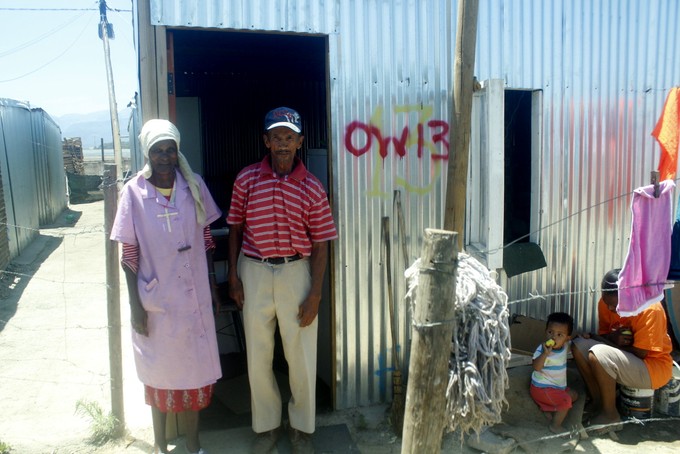“We want a better life, maybe a brick house”
Elderly retrenched farm workers describe their difficulties
About 300 residents of New Rest temporary relocation area in Wellington received electricity last week after waiting almost a year for the service.
“Our appliances [were] just standing there,” says Rosy Isaacs, 64, in Afrikaans. She and her husband, Koos, sit on plastic buckets in the shade of the communal toilets, trying to keep cool. There are no trees in New Rest, and the tin shacks get muggy in the spring heat.
The couple was relocated here last December from the nearby Soetendal Farm, where they worked for thirty-five years. They were one of the 23 families evicted when the farm was sold to a new owner.
Isaacs and her husband remember a time when they were paid in wine for their labour. After apartheid ended, they began receiving cash, but electricity, rent, and water expenses were deducted from their paychecks. Now, the couple survive off their R1,500 monthly state old-age pensions.
The residents of New Rest were lawfully evicted from the Soetendal farm under the Extension of Security of Tenure Act (ESTA), says Christian Julius, an attorney at the Legal Aid Clinic at Stellenbosch University who handled the case along with Lawyers for Human Rights.
ESTA states that people who have residence because of an employment agreement lose their right to residence if they resign or are dismissed legally. Because the farmworkers of New Rest were granted housing through their place of employment, when the farm changed hands, they lost their homes along with their jobs.
The municipality stepped in to provide temporary housing.
The official New Rest community is comprised of 23 tin shacks erected by Drakenstein municipality, no more than a metre apart. The small front yards are separated by barbed wire, which doubles as a drying line for socks and underwear. These state-built homes are surrounded by other informal dwellings, which some New Rest occupants say breeds conflict between the close-knit farm community and their new neighbours.
When ambulances come to New Rest, they are prohibited from entering the settlement by residents of the surrounding shacks, says activist Alvina Abrahams of the Independent Civic Organization of South Africa (ICOSA). One of the three water taps meant to provide for the 300 people of New Rest was recently stolen.
“I can’t sleep at night,” says resident Suzanna Demas, 73. “I’m in constant fear.” She is raising three grandchildren - aged 8, 9, and 12 - who share a room with their grandparents. She worries that the children may fall into a life of crime here.
“Nobody’s working. It’s easy to sell drugs.” Her husband contracted TB earlier this year, and Demas worries about his health and his risk of passing on the illness.
“I’m very surprised that these children don’t have TB,” says Dr Francesca Conradie, a TB specialist at Wits University. The main environmental factors facilitating the spread of TB are overcrowding, poor ventilation, and medium to high heat; New Rest has all three.
Of the residents who do work, most are employed as farmhands. They board lorries early in the morning that transport workers to vineyards in this famous wine region.
“We want a better life,” says Rosy Isaacs. “Maybe a brick house.”
Lochner van Rensburg, spokesperson for Drakenstein municipality, says he is still waiting for the electricity department to explain the nearly year-long delay in service to New Rest.
Next: School falls apart and workers say they haven’t been paid
Previous: “Immigrants link SA to the rest of Africa”
© 2016 GroundUp. 
This article is licensed under a Creative Commons Attribution-NoDerivatives 4.0 International License.
You may republish this article, so long as you credit the authors and GroundUp, and do not change the text. Please include a link back to the original article.



